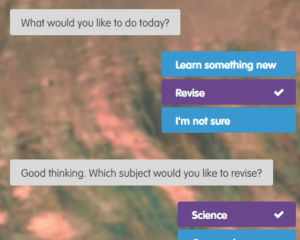
How to get the most out of Educake
Published
Tuesday, 2 April
Categories
Share
Emily Bird, Head of Science at Whalley Range 11-18 High School, offers practical advice for getting teachers, parents and students onboard with Educake, with amazing results.
Our science faculty has used Educake for a number of years. It’s become our main tool for homework and independent recall practice in KS3 and 4.
We have found that when embedding Educake, it is important to understand the benefits and your intentions for using it, and to communicate these clearly.
Here’s what we share with colleagues in department meetings, students in lessons, and parents via email or at parents’ evenings.

Why use Educake?
- It’s quick and easy for students to use independently.
- It helps students to know more and remember more.
- All students have a login they can use on any device. They’re less likely to lose their phone than a printed worksheet!
- The questions are set in a random order, which makes it harder to copy homework.
- All results are saved in a markbook, accessible by students and staff. You can also see league tables for year groups and students, making comparisons between classes and years easy.
- It guides them through their revision by suggesting questions on topics the students struggle with.
- We found a direct correlation in our 2022 year 11 cohort between the number of questions answered by students and their achievement in their GCSEs.

How we use Educake for homework
- Science teachers set one homework a week, with different numbers of questions for different year groups.
- 75% of the questions are on the content students are studying that week, supporting the students to know more. This gives direct feedback to the teachers about performance on the current topic.
- 25% of questions are recall from previous topics, helping the students to remember more. This helps students engage in regular recall for the end-of-year exams and empowers teachers to identify gaps in knowledge that they can then address throughout the year.
- Every week teachers share the whole-class feedback (hiding the individual results) in a lesson, re-teaching any areas where the class has struggled.
- It’s easy to see who has and hasn’t completed their homework and to hold students accountable. Patterns can also be spotted in the markbook over time.
- Student voice has been very positive about Educake as homework. Students like the instant feedback while answering the questions, as well as how quick and easy it is to complete.
- Having the same homework style each week and from each teacher creates a routine, which makes it easier to remember to complete it.
How we use Educake for revision
- Students are taught that they can set themselves additional questions at any time. We also encourage students to try homework questions more than once if they aren’t happy with their score.
- We explicitly teach students in class, and parents at parents’ evenings, how to find and use the Revision Wizard to set revision questions. This removes the issue of “I don’t know what to revise”, as Educake will offer questions on topics where students have low percentages.
- In the lead-up to an assessment, we run Educake competitions, rewarding students who answer the most independent questions within the time period. This promotes the act of revision by rewarding effort rather than scores.

Above all, communicate to colleagues, parents and students that…
The more students use Educake, the more they will get out of it
When we analysed the GCSE results for 2021-22, we found a direct correlation between attainment compared to target, and number of educake questions answered. We shared a graph showing this correlation with all of our students at the start of the year. While it is impossible to be certain of causal relationships in education, the results combined with positive staff and student voice have encouraged us to continue.
All of this was accomplished without adding to staff workload. Not having to create and mark homework gives our teachers more time to think about their explanations and teaching, and the ability to give whole class feedback is low workload but high impact.
With over 100,000 questions answered independently by our students between September and May this year, we are hopeful that the recall practice will support knowledge retention and continue to translate into success for our students.